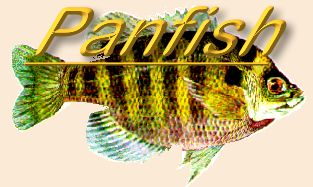|
I headed out Saturday morning for one of my
normal fishing excursions. The sky was clear
and there was no wind. I did remember my life
jacket and canoe paddle. Got to a pond early,
before the sun was even starting to light up
the sky.
Unloaded the canoe and got my stuff in it. I then
pulled it down to the shore to get ready to launch
it. I have gotten smart enough to stop for a minute
and look at the pond to see what might be happening.
I could hear the gills slurping something off the
surface. I could also se a few rises but they were
different. Some were rings and the others were more
oval shape.
This caused my memory bank to kick in and I decided
to change flies. I have been out twice before when
this sort of thing happened and all I could catch
fish on was midges. I went back to the pickup and
opened the door so I could use the dome light to
tie on two flies. The first midge was a size 20
hook with black wooly nylon wrapped on it. The
second was the same thing with a black midge hackle
wrapped at the front. It was too dark to tie them
on any other way.
I went back to the canoe and launched it out on
the pond. So I would know which rod had which fly
on it, I had kept them separate. I took the
hackeless midge and cast it first. I was blind
casting in the dark. The fly had been on the water
for about a minute when the line tightened and I
had a fish on. This was a nice sized gill but the
hook was deep in the gullet. Too far down for me
to see in the dark. I decided to cast out the other
fly and see if anything would happen while I pondered
on how to get the fly out of this fish. This fly had
barely hit the water when a fish slurped it. I waited
a second and then set the hook. This gill came straight
up and out of the water. He jumped three more times
before I got him into the canoe. Again the fly was
deep down the gullet.
I decided to go back to the shore and beach the canoe.
I walked back to the pickup and got a flashlight out
and came back to the canoe. This is one of the long
flashlights so I could hold it under my arm, hold the
fish and with my forceps see the fly to get it out.
Did this with both flies and then moved back onto
the pond. To get away from the deeply hook fish I
began to think that I need to strike faster to
hook them in the mouth or lips. It would also be
easier to get the hook out.
I cast the hackled fly out and let it set for a
few seconds when it was slurped under. I set the
hook immediately and have a gill launch itself
into the air. By the time the gill hits the water
it is free. I bring the fly into check to make
sure that I have not damaged it. I can't see
anything wrong with it.
I cast it again and when a fish slurps it, I
hesitate for an instant before setting the hook.
This fish comes out of the water but I am ready
for this and the rod tip goes down. The fish is
still on, but shakes the hook after a few more
jumps. Not many fish but a lot of fun.
I decide to try the hackleless fly next. As soon
as I see the line twitch, I set the hook. I do get
this gill in but have to net it as the fish is
barely lip hooked. I try this again and hesitate
a little before setting the hook. I think I have
a good hook set but the fish throws the hook on
the fourth jump. I check the hook again but it is
OK. On the next cast I wait for a second before I
set the hook. This fish is on solidly. He does not
want to come in and circles the canoe a couple of
times before I can get the upper hand and have the
fish in the canoe. Again this fish is hooked fairly
deeply.
By now the dawn is starting to break and I can see
rises all over the place. I am just casting and
letting the fish hit. If I can force myself to wait
a second or more before striking I get a good hook
set and have a fish in the boat. Most of the time
I strike too fast and end up lip hooking the fish
and they toss the hook when they jump out of the
water. This is the most that I have ever had
bluegills jump out of the water.
I had caught several when the wind started to blow
a little. I caught a few more and then it was over.
I tried both flies for a while longer but nothing
happened. I went through several other flies and
would catch an occasional fish, but they were few
and far between.
Finally decided that it was time to quit. I headed
for the shore and had just got the canoe up to the
truck when the wind picked up about another 15 mph.
Since I had been paddling into the wind, I sure was
glad to be off the pond.
After I filleted the gills at home, I cut open the
stomach of each of them. They were all full of the
midges. I did not really see any other insects,
minnows or food items in them. The two crappie I
got on other flies also had mostly the midges in
them.
I am not used to midge fishing for panfish, but it
may be something that we need to look at.
If you see rises on the pond but the fish are not
taking anything, try a midge. Also let me know if
it works for you. I am curious to know if this is
something local to me or if it happens else where.
Hope you can get out on the water. ~ Rick ziegeria@grm.net
|



